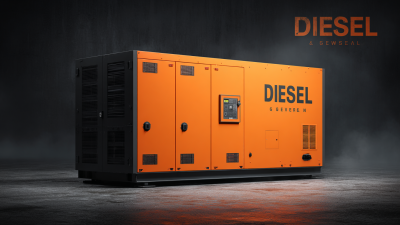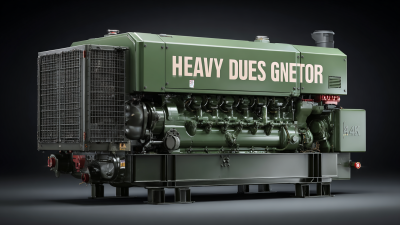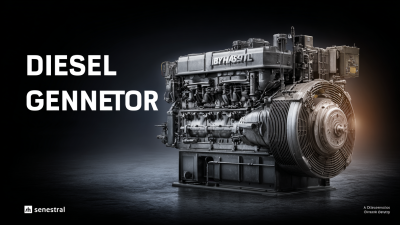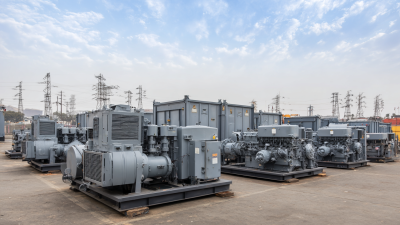
-
Home
-
Products
-
Service
-
About Us
-
Solution
-
Videos
-
News
-
Contact Us
Leave Your Message

In an era marked by increasing energy demands and the looming threat of climate change, Diesel Standby Generators (DSGs) are being re-evaluated within the context of modern energy solutions. While traditionally relied upon for their reliability in backup power scenarios, the 2023 Global Standby Generator Market Report reveals that the demand for sustainable energy alternatives is shifting the landscape. According to the report, the market for alternative energy solutions, including solar and battery storage systems, is projected to grow at a compound annual growth rate (CAGR) of 10.2% over the next five years. However, DSGs still play a crucial role in ensuring energy resilience, especially in critical sectors such as healthcare and data management, where power continuity is paramount. This blog will explore the evolving role of Diesel Standby Generators and their integration with alternative energy sources, highlighting the need for a balanced approach to energy resilience in the face of future challenges.

The evolution of diesel standby generators is a reflection of the growing demand for resilient energy solutions in modern energy systems. With the increasing frequency of power outages and extreme weather events, these generators have transformed from merely backup power sources to critical components of energy security. Advances in technology have greatly enhanced their efficiency, reliability, and reduced emissions, making them an integral part of sustainable energy strategies.
Today’s diesel standby generators are designed with smart technologies that allow for real-time monitoring and management. This not only maximizes performance but also integrates seamlessly with renewable energy sources, ensuring a consistent power supply. As energy systems evolve, the role of diesel generators is being redefined, balancing traditional power needs with innovative approaches to energy resilience. By adapting to modern demands, diesel standby generators are positioned to play a crucial role in the transition towards a more reliable and sustainable energy future.
| Generator Model | Power Output (kW) | Fuel Efficiency (L/h) | Operating Time (hrs) | Emissions (g/kWh) |
|---|---|---|---|---|
| Model A | 150 | 5.5 | 24 | 150 |
| Model B | 200 | 6.0 | 20 | 140 |
| Model C | 100 | 4.0 | 22 | 160 |
| Model D | 250 | 7.5 | 18 | 130 |
| Model E | 300 | 8.0 | 16 | 120 |
Diesel standby generators are emerging as crucial components of resilient infrastructure, offering significant advantages that enhance reliability and efficiency in power generation. One of the most compelling benefits of diesel generators is their robust performance during outages. Unlike some alternative power sources, diesel generators provide consistent and reliable energy, ensuring that critical operations can continue uninterrupted. Their ability to start quickly and handle sudden loads makes them invaluable for businesses and facilities that cannot afford downtime.
Additionally, diesel generators are known for their fuel efficiency and longevity. Modern diesel technology has advanced to minimize emissions while maximizing output, making these generators not only a dependable choice but also a more environmentally conscious one. Furthermore, they require less frequent maintenance compared to other generator types, translating to lower operational costs over time. As infrastructure increasingly seeks sustainable and resilient energy solutions, the role of diesel standby generators becomes more pronounced, safeguarding essential services and enhancing overall system reliability in times of crisis.
The innovative applications of diesel standby generators are expanding across various industries, highlighting their growing importance in today's energy landscape. As the world transitions toward more resilient energy solutions, diesel generators are becoming pivotal in ensuring uninterrupted power supply for critical operations. Industries ranging from healthcare to telecommunications rely on these robust systems to mitigate risks associated with power outages, thereby safeguarding essential services.

Recent market analyses indicate a robust growth trajectory for diesel generator units, reflecting increasing demand driven by advancements in technology and a heightened focus on sustainability. Businesses are increasingly incorporating intelligent, green technologies into their operations, which complement diesel generators' reliability. Furthermore, the rise of portable power solutions and microgrid systems emphasizes the versatility of diesel generators, catering to diverse needs and applications across sectors. The shift towards smarter, more efficient energy solutions suggests a promising horizon for diesel standby generators, reinforcing their role as a backbone for resilient energy infrastructures.
As the world increasingly prioritizes sustainability, the future of diesel standby generators will evolve to accommodate stricter environmental regulations. Traditional diesel technology has often faced criticism for its emissions; however, innovative advancements are paving the way for greener alternatives. Manufacturers are focusing on improving engine efficiency and integrating cleaner combustion processes. This not only reduces greenhouse gas emissions but also enhances overall performance, allowing diesel generators to continue playing a vital role in energy resilience.
Furthermore, the integration of renewable energy sources with diesel generators presents an exciting trend. Hybrid systems that combine solar power or wind energy with diesel backup are gaining traction, enabling users to minimize their carbon footprints while ensuring reliable power. The latest developments in biodiesel and synthetic fuels also offer promising options to reduce reliance on fossil fuels. As industries seek smarter energy solutions, the transformation of diesel technology will be crucial in meeting both energy demands and environmental responsibilities.
The integration of renewable energy with diesel standby solutions is transforming the landscape of energy resilience. As the commercial standby generator market is projected to grow significantly, reaching USD 16.3 billion by 2035, the synergy between renewable sources and traditional diesel generators presents an innovative approach to energy management. By utilizing solar or wind energy alongside diesel systems, organizations can ensure high availability and reduced carbon footprints, making them a prime candidate for sustainable energy strategies.

Tips for integrating renewable energy with diesel generators include assessing your energy requirements and choosing a hybrid system that accommodates both sources effectively. Additionally, regular maintenance of both the renewable components and the diesel generators is crucial to ensure optimal performance. Implementing smart energy management systems can also enhance efficiency, allowing for real-time adjustments based on energy conditions.
Embracing hybrid solutions not only enhances energy reliability but also aligns with global sustainability goals. Companies that adopt these integrated approaches will not only be prepared for increasing energy demands but will also contribute positively to environmental stewardship.





